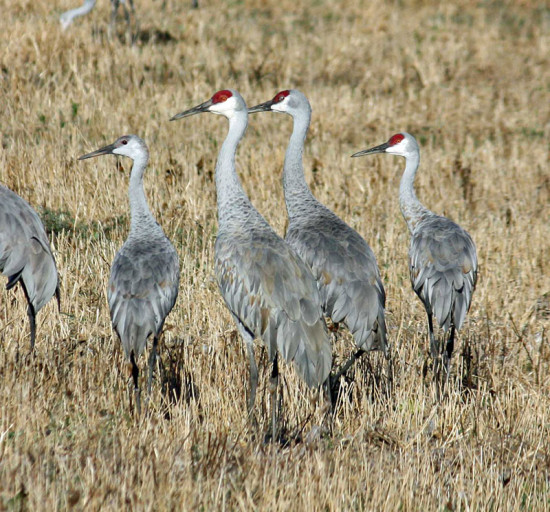MANITOULIN – The Northern caucus of the Ontario Federation of Agriculture (OFA) has passed a motion to provide a letter to a Canadian company in support of its application process of registering and producing a non-lethal repellant that prevents birds, including Sandhill cranes, from eating farmers’ crops.
“Avipel is a bird repellent seed treatment,” said Mark Kunkel, OFA Zone 15 director, representing the Northern Ontario region of Algoma, Cochrane, Dryden, Kenora, Manitoulin-North Shore, Muskoka, Nipissing east and west, Parry Sound, Rainy River, Sudbury east and west, Temiskaming and Thunder Bay late last week. “Avipel is a non-lethal repellant that is approved in the US and used in all states of the Great Lakes, but has not been approved in Canada. It’s very beneficial in keeping Sandhill cranes and other birds, such as starlings, blackbirds, pheasants—basically, anything that eats seed in the ground—from going for corn crops and others.”
Mr. Kunkel explained the Chatham Biotech Company, based out of New Brunswick, can produce the product, and around this time last year it put out a call to agricultural organizations across the country to see if there was any type of emergency and enough interest in them pursuing getting the product registered in Ontario and throughout Canada. “Our Northern group jumped on this and informed them we are very interested.”
For many years, Manitoulin Island and area farmers have advocated for a solution to the problem of farmers’ crops and fields being destroyed due to a proliferation of Sandhill cranes, geese, deer and other animals.
Manitoulin resident Birgit Martin, a member of OFA and its Northern caucus, told the Recorder, “this scientifically formulated seed treatment is produced by Arkion Life Sciences, the manufacturer of Avipel, based out of the US, and they are (also) pursuing registration in Canada.”
“Absolutely, this is good news that the Northern caucus of OFA is pursuing this as well (through Chatham Biotech),” said Ms. Martin. “It’s great to see some movement on this.”
A website explains that in many areas of the US, birds are known to destroy hundreds of acres of fields and sweet corn (and other grains) before the crops even have a chance to emerge. To stop this potentially devastating yield loss, a growing number of farmers have turned to Avipel.
Avipel is a scientifically formulated seed treatment that stops birds from eating newly planted seed. Avipel’s liquid and dry applications surround each kernel with a protective coating that causes birds immediate, yet temporary, digestive distress. After attempting to eat newly planted seed, they quickly look elsewhere, leaving newly planted fields unharmed.
Avipel’s active ingredient is 9,10-anthraquinone (AQ) an organic chemical found in a number of plant species, including aloe vera, rhubarb, greater plantains and sennas. While being a particularly effective agent for repelling birds, AQ is non-lethal to them.
“Obviously with all the concerns that farmers have raised over the years, we need something in Northern Ontario for Sandhill cranes and other birds,” said Mr. Kunkel. “We’re encouraging Chatham Biotech to register to produce and sell Avipel in Canada.”
The Northern Ontario caucus motion reads in part, “whereas the economic damage due to wildlife was estimated at over $265 million across the province in 2018; and whereas Sandhill cranes caused the most damage in Northern Ontario; and whereas a Sandhill crane hunt is currently considered unsustainable for Ontario and farmers currently have limited tools to address Sandhill crane populations and lack compensation for any damage caused to crops. Sandhill crane populations and their associated damage are worsening year after year in some areas in Northern Ontario, and whereas Avipel, a bird repellent produced by Chatham Biotech, is an effective, non-lethal repellant that prevents birds form easting seeds, and Avipel is currently registered and available for use in many states, including those bordering the Great Lakes. Therefore, be it resolved that the Ontario Federation of Agriculture provide a letter to Chatham Biotech in support of registering Avipel. Further, be it resolved that the (OFA) work with any relevant stakeholders to facilitate the registration of Avipel for use in Canada.”





